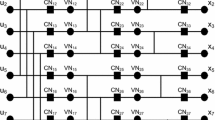Abstract
In this paper, we propose a channel reliability compensation factor to enhance the performance of belief propagation polar decoders on flat Rayleigh fading channels with noisy channel estimates. By including the error variance of the channel estimate in the derivation of the channel intrinsic information, the formula for calculating the value of channel reliability compensation factor is provided. Simulation results show that a BP polar decoder with the proposed compensation factor achieves a gain of 1.5 dB at a BER of \(10^{-3}\) compared to the one without using the compensation factor. This gain is obtained with no additional complexity.






Similar content being viewed by others
Data Availability
Data sharing not applicable to this article as no datasets were generated or analysed during the current study.
References
Alamdar-Yazdi, A., & Kschischang, F. R. (2011). A simplified successive-cancellation decoder for polar codes. IEEE Communications Letters, 15(12), 1378–1380.
Arikan, E. (2009). Channel polarization: A method for constructing capacity-achieving codes for symmetric binary-input memoryless channels. IEEE Transactions on Information Theory, 55(7), 3051–3073.
Arıkan, E. (2010). Polar codes: A pipelined implementation. In Proceeding of the 4th International Symposium on Broad Communication (ISBC 2010), pp. 11–14.
Frenger, P. (2000). Turbo decoding for wireless systems with imperfect channel estimates. IEEE Transactions on Communications, 48(9), 1437–1440.
Guo, J.,&i Fabregas, A.G. (2015) Efficient sphere decoding of polar codes. In 2015 IEEE International Symposium on Information Theory (ISIT) (pp. 236–240). IEEE.
Hall, E. K., & Wilson, S. G. (1998). Design and analysis of turbo codes on Rayleigh fading channels. IEEE Journal on Selected Areas in Communications, 16(2), 160–174.
Husmann, C. C. M., Nikolaou, P. C., & Nikitopoulos, K. (2017). Reduced latency ml polar decoding via multiple sphere-decoding tree searches. IEEE Transactions on Vehicular Technology, 67(2), 1835–1839.
Kahraman, S., & Çelebi, M.E. (2012) Code based efficient maximum-likelihood decoding of short polar codes. In 2012 IEEE International Symposium on Information Theory Proceedings (pp. 1967–1971). IEEE.
Niu, K., & Chen, K. (2012). CRC-aided decoding of polar codes. IEEE Communications Letters, 16(10), 1668–1671.
Niu, K., & Chen, K. (2012). Stack decoding of polar codes. Electronics Letters, 48(12), 695–697.
Niu, K., Chen, K., & Lin, J. (2014). Low-complexity sphere decoding of polar codes based on optimum path metric. IEEE Communications Letters, 18(2), 332–335.
Niu, K., Chen, K., Lin, J., & Zhang, Q. (2014). Polar codes: Primary concepts and practical decoding algorithms. IEEE Communications Magazine, 52(7), 192–203.
Tal, I., & Vardy, A. (2015). List decoding of polar codes. IEEE Transactions on Information Theory, 61(5), 2213–2226.
Tarokh, V., Seshadri, N., & Calderbank, A. R. (1998). Space-time codes for high data rate wireless communication: Performance criterion and code construction. IEEE Transactions on Information Theory, 44(2), 744–765.
Trifonov, P. (2012). Efficient design and decoding of polar codes. IEEE Transactions on Communications, 60(11), 3221–3227.
Worm, A., Hoeher, P., & Wehn, N. (2000). Turbo-decoding without snr estimation. IEEE Communications Letters, 4(6), 193–195.
Yuan, B., & Parhi, K.K. (2013) Architecture optimizations for BP polar decoders. In 2013 IEEE international conference on acoustics, speech and signal processing (pp. 2654–2658). IEEE.
Yuan, B., & Parhi, K. K. (2014). Early stopping criteria for energy-efficient low-latency belief-propagation polar code decoders. IEEE Transactions on Signal Processing, 62(24), 6496–6506.
Zhang, Q., Liu, A., & Zhang, Y. (2016). Signal-to-noise ratio mismatch in polar codes. Electronics Letters, 52(5), 365–367.
Zhang, S.Y., & Shahrrava, B. (2019). Stopping criterion for belief propagation polar code decoders based on bits difference ratio. In: 2019 IEEE 10th Annual Information Technology, Electronics and Mobile Communication Conference (IEMCON), pp. 0285–0289. IEEE
Zhang, S. Y., & Shahrrava, B. (2021). Enhanced BP decoding schemes of polar codes. IET Communications, 15(9), 1133–1142.
Author information
Authors and Affiliations
Corresponding author
Ethics declarations
Conflicts of interest
There is no Conflicts of interest.
Additional information
Publisher's Note
Springer Nature remains neutral with regard to jurisdictional claims in published maps and institutional affiliations.
Rights and permissions
About this article
Cite this article
Zhang, SY., Shahrrava, B. Belief Propagation Polar Decoding for Wireless Communication Systems with Noisy Channel Estimates. Wireless Pers Commun 123, 1365–1377 (2022). https://doi.org/10.1007/s11277-021-09184-7
Accepted:
Published:
Issue Date:
DOI: https://doi.org/10.1007/s11277-021-09184-7




